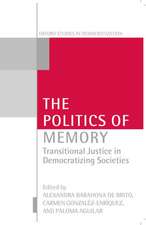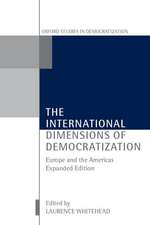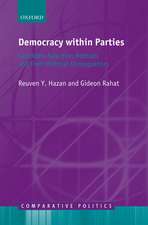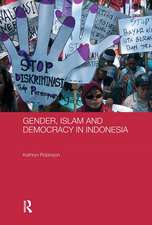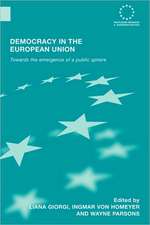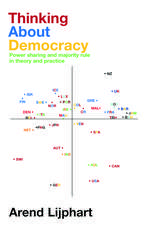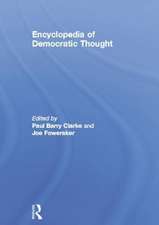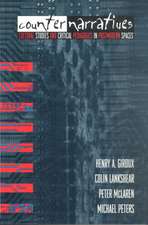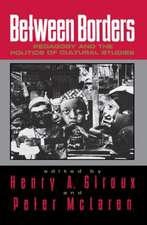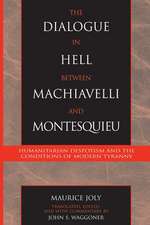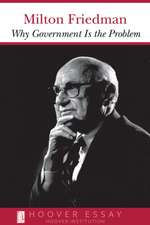Dangerous Thinking in the Age of the New Authoritarianism
Autor Henry A. Girouxen Limba Engleză Paperback – mar 2015
| Toate formatele și edițiile | Preț | Express |
|---|---|---|
| Paperback (1) | 352.25 lei 6-8 săpt. | |
| Taylor & Francis – mar 2015 | 352.25 lei 6-8 săpt. | |
| Hardback (1) | 1273.35 lei 6-8 săpt. | |
| Taylor & Francis – 30 ian 2015 | 1273.35 lei 6-8 săpt. |
Preț: 352.25 lei
Nou
Puncte Express: 528
Preț estimativ în valută:
67.40€ • 70.56$ • 55.77£
67.40€ • 70.56$ • 55.77£
Carte tipărită la comandă
Livrare economică 05-19 aprilie
Preluare comenzi: 021 569.72.76
Specificații
ISBN-13: 9781612058641
ISBN-10: 1612058647
Pagini: 252
Ilustrații: black & white illustrations
Dimensiuni: 152 x 229 x 17 mm
Greutate: 0.35 kg
Ediția:1
Editura: Taylor & Francis
Colecția Routledge
Locul publicării:Oxford, United Kingdom
ISBN-10: 1612058647
Pagini: 252
Ilustrații: black & white illustrations
Dimensiuni: 152 x 229 x 17 mm
Greutate: 0.35 kg
Ediția:1
Editura: Taylor & Francis
Colecția Routledge
Locul publicării:Oxford, United Kingdom
Cuprins
Section 1: Orwell and Huxley’s America
Chapter 1: Between Orwell and Huxley
Chapter 2: Thinking Dangerously in an Age of Political Betrayal
Chapter 3: Data Storms and the Tyranny of Manufactured Forgetting
Chapter 4: Militarism’s Killing Fields
Chapter 5: ISIS and the Spectacle of Terrorism
Chapter 6: Interview Organized Forgetting
Section 2: The Savagery of Neoliberalism
Chapter 7: Beyond Orwellian Nightmares and the Politics of the Deep State
Chapter 8: Neoliberalism and the Machinery of Disposability
Chapter 9: Higher Education and the New Brutalism
Chapter 10: The Poison of Neoliberal Miseducation
Chapter 11: Interview Predatory Neoliberalism as a Global Force
Section 3: Reclaim the Radical Imagination
Chapter 12: The Responsibility of Intellectuals in the Shadow of the Atomic Plague
Chapter 13: Neoliberalism’s War against the Radical Imagination
Chapter 14: Protesting Youth in an Age of Neoliberal Savagery
Chapter 15: Noam Chomsky and the Public Intellectual in Dark Times
Chapter 16: Interview The Specter of Authoritarianism and the Future of the Left
Chapter 1: Between Orwell and Huxley
Chapter 2: Thinking Dangerously in an Age of Political Betrayal
Chapter 3: Data Storms and the Tyranny of Manufactured Forgetting
Chapter 4: Militarism’s Killing Fields
Chapter 5: ISIS and the Spectacle of Terrorism
Chapter 6: Interview Organized Forgetting
Section 2: The Savagery of Neoliberalism
Chapter 7: Beyond Orwellian Nightmares and the Politics of the Deep State
Chapter 8: Neoliberalism and the Machinery of Disposability
Chapter 9: Higher Education and the New Brutalism
Chapter 10: The Poison of Neoliberal Miseducation
Chapter 11: Interview Predatory Neoliberalism as a Global Force
Section 3: Reclaim the Radical Imagination
Chapter 12: The Responsibility of Intellectuals in the Shadow of the Atomic Plague
Chapter 13: Neoliberalism’s War against the Radical Imagination
Chapter 14: Protesting Youth in an Age of Neoliberal Savagery
Chapter 15: Noam Chomsky and the Public Intellectual in Dark Times
Chapter 16: Interview The Specter of Authoritarianism and the Future of the Left
Notă biografică
Henry A. Giroux currently holds the Global TV Network Chair Professorship at McMaster University in the English and Cultural Studies Department. He has published numerous books and articles and his most recent books include America’s Educational Deficit and the War on Youth (2013) and Neoliberalism’s War on Higher Education (2014).
Recenzii
“Giroux’s passion virtually burns up the pages. Giroux calls out the corporate, Orwellian forces destroying our ability to think—a dangerous activity in our authoritarian society. Watch out—this book might turn on the critical imagination circuits in your brain that Giroux argues are our only hope for building democracy.”
—Charles Derber, author of The Disinherited Majority and Sociopathic Society
“In this outstanding book, Henry Giroux dismembers the violent extremism that seeks to dominate humanity. This book is a bracing, eloquent warning.”
—John Pilger, film director and journalist
—Charles Derber, author of The Disinherited Majority and Sociopathic Society
“In this outstanding book, Henry Giroux dismembers the violent extremism that seeks to dominate humanity. This book is a bracing, eloquent warning.”
—John Pilger, film director and journalist
Descriere
Giroux probes the depth and range of forces pushing the United States into a new form of authoritarianism, one that connects the Orwellian surveillance state with the forms of ideological control made famous by Aldous Huxley. Addressing how neoliberalism, or the new market fundamentalism, is shaping a range of registers from language and memory to youth and higher education, Giroux explores how education in a variety of spheres is transformed into a type of miseducation perpetuated through what he calls a "disimagination machine"—one that reproduces the present by either distorting or erasing the past.
But Giroux is not content to focus on how matters of politics, subjectivity, power, and desire are colonized through forms of miseducation; he is also concerned with the educative nature of politics as the practice of freedom and how the emphasis on critique must be matched by a politics and discourse of resistance, hope, and possibility. This becomes particularly evident in his chapters on Noam Chomsky and Howard Zinn. Thinking Dangerously makes clear that at the heart of the struggle for a radical democracy is the reviving of the radical imagination as the basis for new forms of political and collective struggle. Probing these issues through a series of interrelated essays and important interviews, Giroux provides an accessible, layered, and sustained example of how thinking dangerously is central to and connected with the struggle over the radical imagination and the fight to fulfill the promise of a radical democracy.
But Giroux is not content to focus on how matters of politics, subjectivity, power, and desire are colonized through forms of miseducation; he is also concerned with the educative nature of politics as the practice of freedom and how the emphasis on critique must be matched by a politics and discourse of resistance, hope, and possibility. This becomes particularly evident in his chapters on Noam Chomsky and Howard Zinn. Thinking Dangerously makes clear that at the heart of the struggle for a radical democracy is the reviving of the radical imagination as the basis for new forms of political and collective struggle. Probing these issues through a series of interrelated essays and important interviews, Giroux provides an accessible, layered, and sustained example of how thinking dangerously is central to and connected with the struggle over the radical imagination and the fight to fulfill the promise of a radical democracy.


